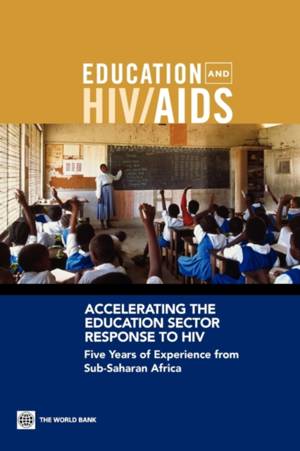
Bedankt voor het vertrouwen het afgelopen jaar! Om jou te bedanken bieden we GRATIS verzending (in België) aan op alles gedurende de hele maand januari.
- Afhalen na 1 uur in een winkel met voorraad
- In januari gratis thuislevering in België
- Ruim aanbod met 7 miljoen producten
Bedankt voor het vertrouwen het afgelopen jaar! Om jou te bedanken bieden we GRATIS verzending (in België) aan op alles gedurende de hele maand januari.
- Afhalen na 1 uur in een winkel met voorraad
- In januari gratis thuislevering in België
- Ruim aanbod met 7 miljoen producten
Zoeken
Accelerating the Education Sector Response to HIV
Donald Bundy, Anthi Patrikios, Changu Mannathoko, Andy Tembon, Stella Manda, Bachir Sarr, Lesley Drake
Paperback | Engels
€ 25,45
+ 50 punten
Omschrijving
The education sector plays a key "external" role in preventing and reducing the stigma surrounding HIV/AIDS. It also plays an important "internal" role in providing access to care, treatment, and support for teachers and education staff, a group that in many countries represents more than 60 percent of the public sector workforce. The education sector can also have a critically important positive effect on the future: Even in the worst-affected countries, most schoolchildren are not infected. For these children, there is a chance to live lives free from AIDS if they can be educated on the knowledge and values that can protect them as they grow up. The authors of 'Accelerating the Education Sector Response to HIV' explore the experiences of education sectors across Sub-Saharan Africa as they scale up their responses to HIV/AIDS within the Accelerate Initiative Working Group, established in 2002 by the Joint United Nations Programme on HIV/AIDS (UNAIDS) Inter-Agency Task Team on Education. This book demonstrates that leadership by the ministries of education and commitment from key development partners are crucial for mobilizing activities and that full participation of all stakeholders is required for effective implementation. This book summarizes the experiences of technical Focal Points from the 37 ministries of education in Sub-Saharan Africa, which are represented on the sub-regional networks for HIV and Education. These experiences prove that the education sector response can play a crucially important role in the multisectoral national responses to this epidemic.
Specificaties
Betrokkenen
- Auteur(s):
- Uitgeverij:
Inhoud
- Aantal bladzijden:
- 128
- Taal:
- Engels
Eigenschappen
- Productcode (EAN):
- 9780821379325
- Verschijningsdatum:
- 30/12/2009
- Uitvoering:
- Paperback
- Formaat:
- Trade paperback (VS)
- Afmetingen:
- 150 mm x 226 mm
- Gewicht:
- 204 g

Alleen bij Standaard Boekhandel
+ 50 punten op je klantenkaart van Standaard Boekhandel
Beoordelingen
We publiceren alleen reviews die voldoen aan de voorwaarden voor reviews. Bekijk onze voorwaarden voor reviews.









